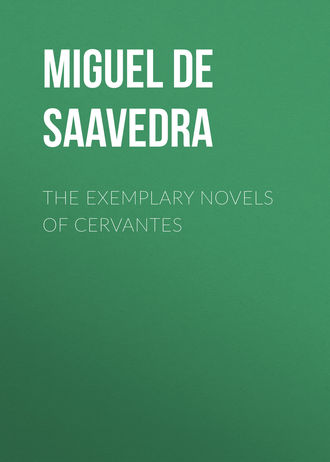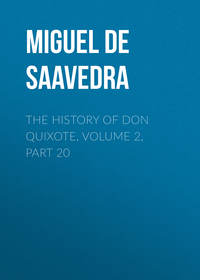 полная версия
полная версияThe Exemplary Novels of Cervantes
The time for their departure being arrived, they were furnished with money, and with a tutor who was more remarkable for integrity than for mother wit. Their fathers talked much and impressively to their sons about what they should do, and how they should govern themselves, in order that they might become fraught with virtue and knowledge, for that is the fruit which every student should aspire to reap from his labours and his vigils, especially such as are of good family. The sons were all humility and obedience; their mothers cried; both parents gave them their blessing, and away they went, mounted on their own mules, and attended by two servants of their respective households, besides the tutor, who had let his beard grow, to give him a more imposing air of gravity, as became his charge.
When they arrived at Valladolid, they told their tutor they should like to remain there a couple of days to see the city, having never been in it before. The tutor severely reprimanded them for entertaining any such idle notion, telling them they had no time to lose in silly diversions; that their business was to get as fast as possible to the place where they were to pursue their studies; that he should be doing extreme violence to his conscience if he allowed them to stop for one hour, not to speak of two days; that they should continue their journey forthwith, or, if not, then brown bread should be their portion.
Such was the extent of the ability in his office possessed by this tutor, or major-domo, as we should rather call him. The lads, who had already gathered in their harvest, since they had laid hands upon four hundred gold crowns which were in the major-domo's keeping, begged that he would let them remain in Valladolid for that day only, that they might see the grand aqueducts, which were then in course of construction, for the purpose of conveying the waters of Argales to that city. He consented at last, but with extreme reluctance, for he wished to avoid the expense of an additional day on the road, and to spend the night at Valdiastellas, whence he could easily reach Salamanca in two days. But the bay horse thinks one thing, and the man on his back another thing, and so it proved in the major-domo's case. The lads, mounted on two excellent mules, and attended by only one servant, rode out to see the fountain of Argales, famous for its antiquity and the abundance of its water. On their arrival there, Avendaño gave the servant a sealed paper, bidding him return forthwith to the city, and deliver it to his tutor, after which the servant was to wait for them at the Puerta del Campo. The servant did as he was bid, and went back to the city with the letter; and they, turning their mules' heads another way, slept that night in Mojados, and arrived two days afterwards in Madrid, where they sold their mules.
They dressed themselves like peasants in short jerkins, loose breeches, and gray stockings. An old clothes dealer, to whom they sold their handsome apparel in the morning, transformed them by night in such a manner that their own mothers would not have known them. Lightly equipped, as suited their purpose, and without swords, for they had sold them to the old clothes dealer, they took to the road to Toledo. There let us leave them for the present, stepping out briskly with merry hearts, while we return to the tutor, and see him open the letter delivered to him by the servant, which he read as follows: —
"Your worship, señor Pedro Alonso, will be pleased to have patience and go back to Burgos, where you will say to our parents that we, their sons, having with mature deliberation considered how much more arms befit cavaliers than do letters, have determined to exchange Salamanca for Brussels, and Spain for Flanders. We have got the four hundred crowns; the mules we intend to sell. The course we have chosen, which is so worthy of persons of our quality, and the length of the journey before us, are sufficient to excuse our fault, though a fault it will not be deemed by any one but a coward. Our departure takes place now; our return will be when it shall please God, to whose keeping, we, your humble pupils, heartily commend you. Given from the fountain of Argales, with one foot in the stirrup for Flanders.
"CARRIAZO,"AVENDANO."Aghast at the contents of this letter, Pedro Alonso hurried to his valise, and found that the paper spoke but too truly, for the money was gone. Instantly mounting the remaining mule, he returned to Burgos to carry these tidings to his patrons, in order that they might take measures to recover possession of their sons' persons. But as to how he was received, the author of this tale says not a word, for the moment he has put Pedro Alonso into the saddle, he leaves him to give the following account of what occurred to Avendaño and Carriazo at the entrance of Illescas.
Just by the town gate they met two muleteers, Andalusians apparently, one of whom was coming from Seville, and the other going thither. Said the latter to the former, "If my masters were not so far ahead, I should like to stop a little longer to ask you a thousand things I want to know, for I am quite astonished at what you have told me about the conde's having hanged Alonzo Gines and Ribera without giving them leave to appeal."
"As I'm a sinner," replied the Sevillian, "the conde laid a trap for them, got them under his jurisdiction – for they were soldiers, and once having them in his gripe, the court of appeal could never get them out of it. I tell you what it is, friend, he has a devil within him, that same conde de Puñonrostro. Seville, and the whole country round it for ten leagues, is swept clear of swash-bucklers; not a thief ventures within his limits; they all fear him like fire. It is whispered, however, that he will soon give up his place as corregidor, for he is tired of being at loggerheads at every hand's turn with the señores of the court of appeal."
"May they live a thousand years!" exclaimed he who was going to Seville; "for they are the fathers of the miserable, and a refuge for the unfortunate. How many poor fellows must eat dirt, for no other reason than the anger of an arbitrary judge of a corregidor, either ill-informed or wrong-headed! Many eyes see more than two; the venom of injustice cannot so soon lay hold on many hearts as on one alone."
"You have turned preacher!" said he of Seville; "but I am afraid I can't stop to hear the end of your sermon. Don't put up to night at your usual place, but go to the Posada del Sevillano, for there you will see the prettiest scullery-wench I know. Marinilla at the Venta Tejada is a dishclout in comparison with her. I will only tell you that it is said the son of the corregidor is very sweet upon her. One of my masters gone on ahead there, swears, that on his way back to Andalusia, he will stop two months in Toledo, and in that same inn, only to have his fill of looking at her. I myself ventured once to give her a little bit of a squeeze, and all I got for it was a swinging box on the ear. She is as hard as a flint, as savage as a kestrel, and as touch-me-not as a nettle; but she has a face that does a body's eyes good to look at. She has the sun in one cheek, and the moon in the other; the one is made of roses and the other of carnations, and between them both are lilies and jessamine. I say no more, only see her for yourself, and you will see that all I have told you is nothing to what I might say of her beauty. I'd freely settle upon her those two silver gray mules of mine that you know, if they would let me have her for my wife; but I know they won't, for she is a morsel for an archbishop or a conde. Once more I say, go and see her; and so, good-bye to you, for I must be off."
The two muleteers went their several ways, leaving the two friends much struck by what they had overheard of the conversation, especially Avendaño, in whom the mere relation which the muleteer had given of the scullery-maid's beauty awoke an intense desire to see her. It had the same effect on Carriazo, but not to an equal degree, nor so as to extinguish his desire to reach his beloved tunny fisheries, from which he would not willingly be delayed to behold the pyramids of Egypt, or any or all of the other seven wonders of the world.
Repeating the dialogue between the muleteers, and mimicking their tones and gestures, served as pastime to beguile the way until they reached Toledo. Carriazo, who had been there before, led the way at once to the Posada del Sevillano; but they did not venture to ask for accommodation there, their dress and appearance not being such as would have gained them a ready welcome. Night was coming on, and though Carriazo importuned Avendaño to go with him in search of lodgings elsewhere, he could not prevail on him to quit the doors of the Sevillano, or cease from hanging about them, upon the chance that the celebrated scullery-maid might perhaps make her appearance. When it was pitch dark Carriazo was in despair, but still Avendaño stuck to the spot; and, at last, he went into the courtyard of the inn, under pretence of inquiring after some gentlemen of Burgos who were on their way to Seville. He had but just entered the courtyard, when a girl, who seemed to be about fifteen, and was dressed in working clothes, came out of one of the side doors with a lighted candle. Avendaño's eyes did not rest on the girl's dress, but on her face, which seemed to him such as a painter would give to the angels; and so overcome was he by her beauty, that he could only gaze at it in speechless admiration, without being able to say one word for himself.
"What may you please to want, brother?" said the girl. "Are you servant to one of the gentlemen in the house?"
"I am no one's servant but yours," replied Avendaño, trembling with emotion.
"Go to, brother," returned the girl disdainfully, "we who are servants ourselves have no need of others to wait on us;" and calling her master, she said, "Please to see, sir, what this lad wants."
The master came out, and, in reply to his question, Avendaño said that he was looking for some gentlemen of Burgos who were on their way to Seville. One of them was his master, and had sent him on before them to Alcalá de Henares upon business of importance, bidding him, when that was done, to proceed to Toledo, and wait for him at the Sevillano; and he believed that his master would arrive there that night or the following day at farthest.
So plausibly did Avendaño tell this fib that the landlord was quite taken in by it. "Very well, friend," said he, "you may stop here till your master comes."
"Many thanks, señor landlord," replied Avendaño; "and will your worship bid them give me a room for myself, and a comrade of mine who is outside? We have got money to pay for it, as well as another."
"Certainly," said the host, and turning to the girl he said, "Costanza, bid la Argüello take these two gallants to the corner room, and give them clean sheets."
"I will do so, señor," and curtsying to her master she went away, leaving Avendaño by her departure in a state of feeling like that of the tired wayfarer when the sun sets and he finds himself wrapt in cheerless darkness. He went, however, to give an account of what he had seen and done to Carriazo, who very soon perceived that his friend had been smitten in the heart; but he would not say a word about the matter then, until he should see whether there was a fair excuse for the hyperbolical praises with which Avendaño exalted the beauty of Costanza above the stars.
At last they went in doors, and la Argüello, the chamber maid, a woman of some five-and-forty years of age, showed them a room which was neither a gentleman's nor a servant's, but something between the two. On their asking for supper, la Argüello told them they did not provide meals in that inn; they only cooked and served up such food as the guests bought and fetched for themselves; but there were eating-houses in the neighbourhood, where they might without scruple of conscience go and sup as they pleased. The two friends took la Argüello's advice, and went to an eating-house, where Carriazo supped on what they set before him, and Avendaño on what he had brought with him, to wit, thoughts and fancies. Carriazo noticed that his friend ate little or nothing, and, by way of sounding him, he said on their way back to the inn, "We must be up betimes to-morrow morning, so that we may reach Orgez before the heat of the day."
"I am not disposed for that," replied Avendaño, "for I intend, before I leave this city, to see all that is worth seeing in it, such as the cathedral, the waterworks of Juanelo, the view from the top of St. Augustine's, the King's garden, and the promenade by the river."
"Very well, we can see all that in two days."
"What need of such haste? We are not posting to Rome to ask for a vacant benefice."
"Ha! ha! friend, I see how it is, I'll be hanged if you are not more inclined to stay in Toledo than to continue our journey."
"That's true, I confess; it is as impossible for me to forego the sight of that girl's face, as it is to get into heaven without good works."
"Gallantly spoken, and as becomes a generous breast like yours! Here's a pretty story! Don Tomas de Avendaño, son of the wealthy and noble cavalier, Don Juan de Avendaño, over head and ears in love with the scullery-maid at the Posada del Sevillano!"
"It strikes me, I may answer you in the same strain. Here's Don Diego de Carriazo, son and sole heir of the noble knight of Alcántara of the same name, a youth finely gifted alike in body and mind, and behold him in love – with whom, do you suppose? With queen Ginevra? No such thing, but with the tunny fisheries of Zahara, and all its rogues and rascals, – a more loathsome crew, I suspect, than ever beset St. Anthony in his temptations."
"You have given me tit for tat, friend, and slain me with my own weapon. Let us say no more now, but go to bed, and to-morrow who knows but we come to our senses?"
"Look ye, Carriazo, you have not yet seen Costanza; when you have seen her, I will give you leave to say what you like to me."
"Well, I know beforehand what will be the upshot of the matter."
"And that is?"
"That I shall be off to my tunny fisheries, and you will remain with your scullery-maid."
"I shall not be so happy."
"Nor I such a fool as to give up my own good purpose for the sake of your bad one."
By this time they reached the inn, where the conversation was prolonged in the same tone, half the night long. After they had slept, as it seemed to them, little more than an hour, they were awakened by the loud sound of clarions in the street. They sat up in bed, and after they had listened awhile, "I'll lay a wager," said Carriazo, "that it is already day, and that there is some feast or other in the convent of Nostra Señora del Carmen, in this neighbourhood, and that is why the clarions are pealing."
"That can't be," said Avendaño; "we have not been long asleep. It must be some time yet till dawn."
While they were talking, some one knocked at the door, and called out, "Young men, if you want to hear some fine music, go to the window of the next room, which looks on the street; it is not occupied."
They got up and opened the door, but the person who had spoken was gone. The music still continuing, however, they went in their shirts, just as they were, into the front room, where they found three or four other lodgers, who made place for them at the window; and soon afterwards an excellent voice sang a sonnet to the accompaniment of the harp. There was no need of any one to tell Carriazo and Avendaño that this music was intended for Costanza, for this was very clear from the words of the sonnet, which grated so horribly on Avendaño's ears, that he could have wished himself deaf rather than have heard it. The pangs of jealousy laid hold on him, and the worst of all was, that he knew not who was his rival. But this was soon made known to him when one of the persons at the window exclaimed, "What a simpleton is the corregidor's son, to make a practice of serenading a scullery-maid. It is true, she is one of the most beautiful girls I have ever seen, and I have seen a great many; but that is no reason why he should court her so publicly."
"After all," said another, "I have been told for certain that she makes no more account of him than if he never existed. I warrant she is this moment fast asleep behind her mistress's bed, without ever thinking of all this music."
"I can well believe it," said the first speaker, "for she is the most virtuous girl I know; and it is marvellous that though she lives in a house like this, where there is so much traffic, and where there are new comers every day, and though she goes about all the rooms, not the least thing in the world is known to her disparagement."
Avendaño began to breathe more freely after hearing this, and was able to listen to many fine things which were sung to the accompaniment of various instruments, all being addressed to Costanza, who, as the stranger said, was fast asleep all the while.
The musicians departed at the approach of dawn. Avendaño and Carriazo returned to their room, where one of them slept till morning. They then rose, both of them eager to see Costanza, but the one only from curiosity, the other from love. Both were gratified; for Costanza came out of her master's room looking so lovely, that they both felt that all the praises bestowed on her by the muleteer, fell immeasurably short of her deserts. She was dressed in a green bodice and petticoat, trimmed with the same colour. A collar embroidered with black silk set off the alabaster whiteness of her neck. The thick tresses of her bright chestnut hair were bound up with white ribbon; she had pendents in her ears which seemed to be pearls, but were only glass; her girdle was a St. Francis cord, and a large bunch of keys hung at her side. When she came out of the room she crossed herself, and made a profound reverence with great devotion to an image of our Lady, that hung on one of the walls of the quadrangle. Then looking up and seeing the two young men intently gazing on her, she immediately retired again into the room, and called thence to Argüello to get up.
Carriazo, it must be owned, was much struck by Costanza's beauty; he admired it as much as his companion, only he did not fall in love with her; on the contrary, he had no desire to spend another night in the inn, but to set out at once for the fisheries.
La Argüello presently appeared in the gallery with two young women, natives of Gallicia, who were also servants in the inn; for the number employed in the Sevillano was considerable, that being one of the best and most frequented houses of its kind in Toledo. At the same time the servants of the persons lodging in the inn began to assemble to receive oats for their masters' beasts; and the host dealt them out, all the while grumbling and swearing at his maid-servants who had been the cause of his losing the services of a capital hostler, who did the work so well and kept such good reckoning, that he did not think he had ever lost the price of a grain of oats by him. Avendaño, who heard all this, seized the opportunity at once. "Don't fatigue yourself, señor host," he said; "give me the account-book, and whilst I remain here I will give out the oats, and keep such an exact account of it that you will not miss the hostler who you say has left you."
"Truly I thank you for the offer, my lad," said the host, "for I have no time to attend to this business; I have too much to do, both indoors and out of doors. Come down and I will give you the book; and mind ye, these muleteers are the very devil, and will do you out of a peck of oats under your very nose, with no more conscience than if it was so much chaff."
Avendaño went down to the quadrangle, took the book, and began to serve out pecks of oats like water, and to note them down with such exactness that the landlord, who stood watching him, was greatly pleased with his performance. "I wish to God," he said, "your master would not come, and that you would make up your mind to stop with me; you would lose nothing by the change, believe me. The hostler who has just quitted me came here eight months ago all in tatters, and as lean as a shotten herring, and now he has two very good suits of clothes, and is as fat as a dormouse; for you must know, my son, that in this house there are excellent vails to be got over and above the wages."
"If I should stop," replied Avendaño, "I should not stand out much for the matter of what I should gain, but should be content with very little for sake of being in this city, which, they tell me, is the best in Spain."
"At least it is one of the best and most plentiful," said the host. "But we are in want of another thing, too, and that is a man to fetch water, for the lad that used to attend to that job has also left me. He was a smart fellow, and with the help of a famous ass of mine he used to keep all the tanks overflowing, and make a lake of the house. One of the reasons why the muleteers like to bring their employers to my house is, that they always find plenty of water in it for their beasts, instead of having to drive them down to the river."
Carriazo, who had been listening to this dialogue, and who saw Avendaño already installed in office, thought he would follow his example, well knowing how much it would gratify him. "Out with the ass, señor host," he said; "I'm your man, and will do your work as much to your satisfaction as my comrade."
"Aye, indeed," said Avendaño, "my comrade, Lope Asturiano will fetch water like a prince, I'll go bail for him."
La Argüello, who had been all the while within earshot, here put in her word. "And pray, my gentleman," said she to Avendaño, "who is to go bail for you? By my faith, you look to me as if you wanted some one to answer for you instead of your answering for another."
"Hold your tongue, Argüello," said her master; "don't put yourself forward where you're not wanted. I'll go bail for them, both of them. And mind, I tell you, that none of you women meddle or make with the men-servants, for it is through you they all leave me."
"So these two chaps are engaged, are they?" said another of the servant-women; "by my soul, if I had to keep them company I would never trust them with the wine-bag."
"None of your gibes, señora Gallega," cried her master; "do your work, and don't meddle with the men-servants, or I'll baste you with a stick."
"Oh, to be sure!" replied the Gallician damsel; "a'nt they dainty dears to make a body's mouth water? I'm sure master has never known me so frolicksome with the chaps in the house, nor yet out of it, that he should have such an opinion of me. The blackguards go away when they take it into their heads, without our giving them any occasion. Very like indeed they're the right sort to be in need of any one's putting them to bidding their masters an early good morning, when they least expect it."
"You've a deal to say for yourself, my friend," said the landlord; "shut your mouth and mind your business."
While this colloquy was going on Carriazo had harnessed the ass, jumped on his back, and set off to the river, leaving Avendaño highly delighted at witnessing his jovial resolution.
Here then, we have Avendaño and Carriazo changed, God save the mark! into Tomas Pedro, a hostler, and Lope Asturiano, a water-carrier: transformations surpassing those of the long-nosed poet. No sooner had la Argüello heard that they were hired, than she formed a design upon Asturiano, and marked him for her own, resolving to regale him in such a manner, that, if he was ever so shy, she would make him as pliant as a glove. The prudish Gallegan formed a similar design upon Avendaño, and, as the two women were great friends, being much together in their business by day, and bed-fellows at night, they at once confided their amorous purposes to each other; and that night they determined to begin the conquest of their two unimpassioned swains. Moreover they agreed that they must, in the first place, beg them not to be jealous about anything they might see them do with their persons; for girls could hardly regale their friends within doors, unless they put those without under contribution. "Hold your tongues, lads," said they, apostrophising their absent lovers, "hold your tongues and shut your eyes; leave the timbrel in the hands that can play it, and let those lead the dance that know how, and no pair of canons in this city will be better regaled than you will be by our two selves."









